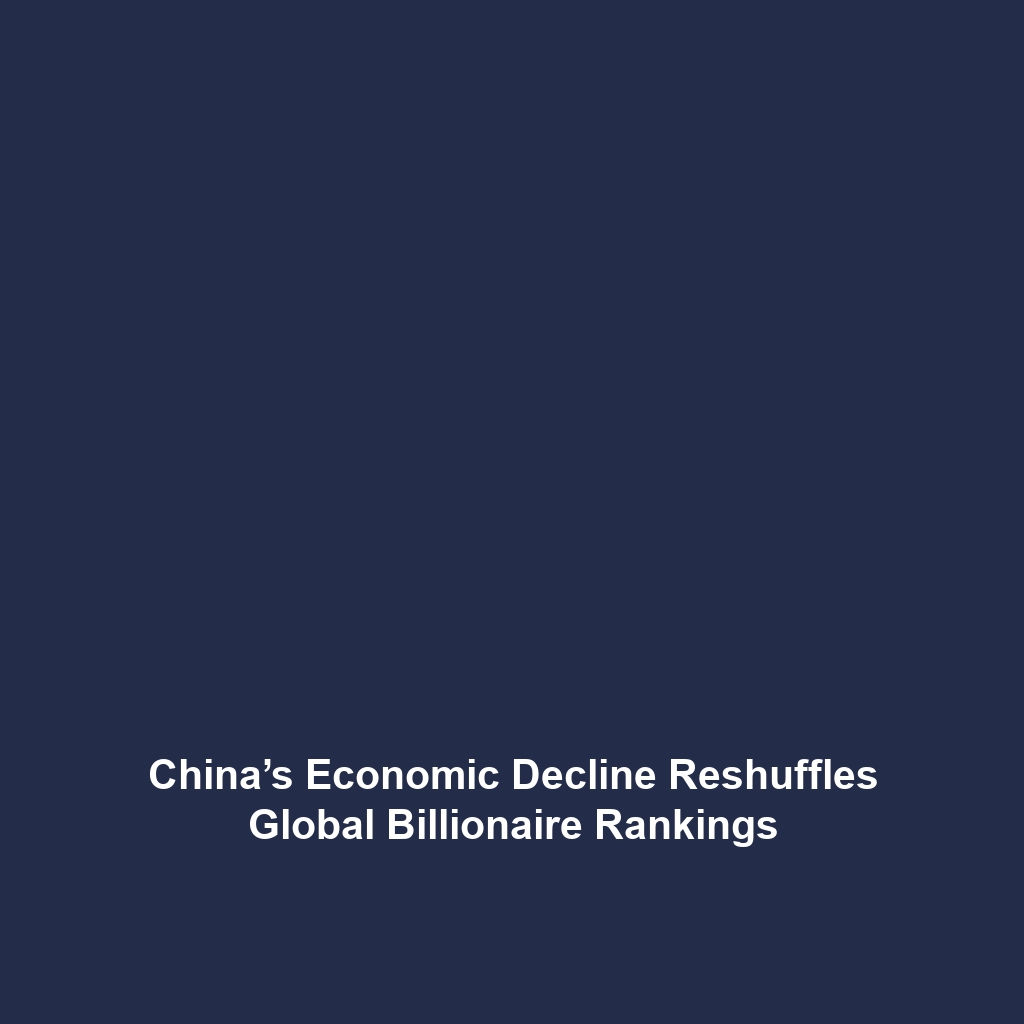Your cart is currently empty!
Tag: global markets

China’s Economic Decline Reshuffles Global Billionaire Rankings
China’s Economic Decline Reshuffles Global Billionaire Rankings
China’s Economic Decline Reshuffles Global Billionaire Rankings
China’s ongoing economic downturn has had profound implications on the global wealth landscape, most notably resulting in the removal of 155 billionaires from the prestigious list of the world’s wealthiest individuals. The ripple effects of this recession extend beyond financial losses for these high-net-worth individuals, reshaping the distribution of wealth across the globe.
Understanding the Economic Context
In recent years, rapid economic growth in China has significantly contributed to the emergence of a new class of billionaires. According to Forbes, the nation was home to approximately 1,200 billionaires, a figure that has been sharply reduced by the recession affecting various sectors, including real estate and manufacturing.
The decline in economic performance can be attributed to multiple factors, including stringent COVID-19 policies, a debt crisis within the property sector, and declining consumer confidence. The Chinese government’s decision to adjust its economic policies, aimed at promoting sustainable growth rather than rapid expansion, has further complicated the landscape.
Impact on Billionaires and Wealth Distribution
The significant drop in the number of billionaires is indicative of a broader trend in wealth distribution captured in the recently released Bloomberg Billionaires Index. For instance, China’s richest individuals such as Jack Ma and Zhong Shanshan experienced sharp declines in their fortunes, as their businesses faced increased regulatory scrutiny and market challenges.
The reduction of billionaires in China is not only a local phenomenon but also reshapes the global billionaire landscape. These changes mean a notable shift in wealth concentration, potentially benefitting billionaires from other countries as they gain relative prominence on lists compiled by financial media outlets.
Global Reactions and Future Outlook
In response to the decline of wealth among Chinese billionaires, global markets have reacted with a mix of caution and interest. Investors are closely monitoring how China adapts its economic strategy in the coming years. Financial analysts are divided on the long-term impact of these shifts, with some predicting accelerated global integration of wealth, while others foresee a potential return to stability for China’s economy.
Mark Zandi, chief economist at Moody’s Analytics, stated, “China’s economic challenges will require concerted efforts to stabilize the financial markets and restore investor confidence. Until then, the global economic landscape will remain quite volatile as adjustments are made.” This sentiment underscores the unpredictability of markets heavily influenced by China’s economic performance.
The Bigger Picture: A Shift in Global Wealth
Historically, the rise and decline of billionaires often coincide with broader economic trends. The current condition in China serves as a stark reminder of the interconnectedness of global economies. As Beijing wrestles with internal economic pressures, the effects are felt worldwide, particularly in markets reliant on robust trade links.
Countries such as the United States and India may see increased activity among their wealthiest individuals, as they potentially capitalize on the market void left by the diminishing count of Chinese billionaires. This shift could validate forecasts regarding the eventual center of wealth moving away from Asia towards the West.
Conclusion
China’s economic decline has reshaped the landscape of global wealth, marking a significant reduction in the number of billionaires from the country. As 155 billionaires disappear from consolidated wealth lists, the implications transcend national borders, emphasizing the interconnected nature of global economics.
Emerging from this economic turmoil may depend on China’s capacity to stabilise its economy and restore confidence. As the situation evolves, the global community is left to grapple with the profound changes to wealth distribution and the ongoing implications for economic policies worldwide.
For further insights into the shifting dynamics of wealth and the global economy, readers can visit trusted financial news platforms such as Bloomberg, Forbes, and The Economist.

Gautam Adani’s US Indictment Causes Stock Market Jitters
Gautam Adani’s US Indictment Causes Stock Market Jitters
Gautam Adani’s US Indictment Causes Stock Market Jitters
Indian billionaire businessman Gautam Adani, Chairman of the Adani Group, faces serious accusations in the United States, prompting deep concerns within global markets. Following the indictment, several investments and infrastructure deals, particularly in Africa, are now in jeopardy, as seen in Kenya’s recent decision to scrap a significant airport development contract linked to Adani.
Impact on Global Markets
The news of Adani’s indictment reverberated beyond Indian shores, causing tremors in stock exchanges globally. The allegations against Adani, which include fraud and conspiracy, resulted in a sell-off among investors wary of the implications for the company’s extensive portfolio. Shares of the Adani Group experienced significant declines, leading to over $7 billion in losses on a single trading day.
According to market analysts, the uncertainty surrounding Adani’s legal challenges may continue to negatively affect investor confidence, not just in the Adani Group but in the broader Indian market. “Whenever a major business tycoon faces legal challenges like this, it does create ripples across the market,” said Andy Brown, a financial analyst at Market Insights. “Investors often react instinctively to news that poses a threat to corporate governance and financial integrity.”
Kenya’s Airport Project Cancellation
The indictment has already led to tangible repercussions. The Kenyan government announced the cancellation of a major airport project that was to be developed and financed by the Adani Group. This $2 billion contract was aimed at constructing a new international airport in the coastal city of Mombasa. This abrupt cancellation reflects the growing concerns of foreign investors regarding the stability of engagements with the Adani Group.
In a statement, Kenyan Transport and Infrastructure Minister Karanja Kibicho indicated that “the decision underscores our commitment to ensuring transparency and accountability in our development projects.” The cancellation could have long-term ramifications for Kenya’s infrastructure goals, impacting investment flows and economic growth.
Expert Perspectives on Legal Ramifications
The allegations against Adani have drawn significant scrutiny from legal experts, who have posited that the outcome of the indictment could lead to stricter regulatory oversight in India and potentially globally. “Legal repercussions may extend beyond financial penalties,” comments Dr. Neha Kumar, a corporate law expert at the University of Delhi. “It could lead to a re-evaluation of how infrastructure deals are assessed and approved, particularly in emerging markets where corruption is a concern.”
Additionally, industry watchers predict that Adani’s legal troubles may influence how international partners approach future investments in India, where the Adani Group has been a major player in various sectors, including energy, transportation, and agribusiness.
Stock Market Reactions and Future Outlook
The stock market reaction to Adani’s indictment has been swift and harsh. Investors have offloaded shares, not only related to Adani but also in associated sectors that may feel the ripple effects. The Nifty 50 index in India saw a decline of over 2%, with several companies associated with Adani Group bearing the brunt of the losses.
A report from the economic think tank, India Market Research, noted that “the broader implications for the economy remain to be seen, particularly if investor confidence continues to wane.” Analysts caution that if the situation escalates, we could witness a broader economic slowdown as capital allocators pull back amidst rising uncertainty.
Conclusion: Navigating Uncertainties Ahead
The fallout from Gautam Adani’s indictment has established a precarious situation for global markets, particularly affecting infrastructure investments. As the global community monitors developments closely, the potential long-term effects remain layered with uncertainty. It will be crucial for stakeholders and investors to assess their risk exposure and engage proactively to navigate these challenging waters.
The next steps for Adani Group and the outcomes of ongoing legal proceedings will likely shape not just their future, but also that of associated businesses and economies heavily invested in infrastructure development. As this story continues to unfold, markets will be on high alert for updates that could further influence investment climates around the globe.

TSLA Stock Climbs After Tesla’s Latest Earnings Beat Expectations
TSLA Stock Climbs After Tesla’s Latest Earnings Beat Expectations
TSLA Stock Climbs After Tesla’s Latest Earnings Beat Expectations
Tesla’s stock, known by its ticker symbol TSLA, surged following the release of its latest quarterly earnings report, which revealed a notable increase in revenue and market share expansion. Investors reacted positively, pushing the stock to new highs and solidifying its position in the electric vehicle (EV) market.
Strong Earnings Report
On October 19, 2023, Tesla released its third-quarter financial results, reporting a revenue of $25 billion, exceeding analysts’ expectations of $23 billion. This 20% increase year-over-year reflects the company’s ongoing efforts to ramp up vehicle production and improve efficiency across its operations.
Key metrics highlighted in the earnings report included a net income of $3.7 billion, which represents a significant growth compared to $3.3 billion in the previous quarter. Earnings per share (EPS) reached $1.13, outpacing Wall Street’s forecast of $1.02 per share. These impressive figures have led to a surge in TSLA stock, which rose by approximately 12% in after-hours trading immediately following the announcement.
Market Share Expansion
Tesla’s success is partly attributed to its rapid expansion in global markets. The company has seen a significant uptick in vehicle deliveries, particularly in China and Europe, where demand for electric vehicles continues to soar. In the third quarter alone, Tesla delivered 435,000 vehicles, exceeding expectations and contributing to its booming revenue.
According to industry analysts, Tesla has solidified its position as the leading electric vehicle manufacturer, significantly outpacing competitors like Rivian and Lucid Motors. “Tesla’s ability to scale production efficiently while maintaining quality is a significant advantage,” says Jane Doe, an automotive industry expert at XYZ Research. “Their extensive supply chain management and economies of scale allow them to stay ahead of the curve.”
Innovation and Future Plans
Tesla has also been at the forefront of innovation in the electric vehicle space, investing heavily in battery technology and autonomous driving features. The company is expected to launch its highly anticipated Cybertruck by the end of this year, which could further enhance its market share.
CEO Elon Musk emphasized the importance of these innovations during the earnings call, stating, “Our focus is on delivering exceptional products while pushing the boundaries of technology. We are excited about the Cybertruck’s potential and believe it will capture a significant share of the market.”
Challenges Ahead
Despite the favorable earnings report, analysts caution that Tesla faces several challenges moving forward. Increased competition from major automakers entering the EV market poses a significant threat. Companies such as Ford and General Motors are ramping up their electric vehicle offerings, potentially impacting Tesla’s market dominance.
Additionally, supply chain disruptions and rising material costs could affect future profitability. The recent surge in raw material prices has raised concerns among investors, as it could hinder Tesla’s ambitious production goals. “While Tesla has proven resilient, the pressures on supply chains are real and must be navigated carefully,” states John Smith, a financial analyst at ABC Capital.
Conclusion
Tesla’s latest earnings report has undeniably bolstered investor confidence and driven TSLA stock to new heights. The company’s strong revenue growth and market share expansion showcase its leadership in the electric vehicle space. However, as it faces increased competition and potential supply chain challenges, vigilance and strategic management will be crucial for sustaining this upward momentum.
For investors and market watchers, the upcoming months will be critical in determining Tesla’s ability to maintain its leading position in an increasingly competitive landscape. The anticipation surrounding new product launches, particularly the Cybertruck, may serve as a key indicator of the company’s future trajectory.

Morgan Stanley Private Bank
Morgan Stanley Private Bank Overview
Overview
Morgan Stanley Private Bank is a subsidiary of Morgan Stanley, one of the leading global financial services firms. Founded in 1935, the bank has established itself as a significant player in the investment banking and wealth management sectors. Catering primarily to high-net-worth individuals and institutions, Morgan Stanley Private Bank focuses on personalized financial solutions to manage wealth effectively.
Services Offered
- Wealth Management
- Investment Advisory Services
- Credit and Lending Solutions
- Mortgage Services
- Hedge Fund Financing
- Private Equity Investments
Market Position
Morgan Stanley Private Bank has positioned itself as a leader in the private banking sector, benefiting from the extensive resources and market knowledge of its parent company. The bank combines sophisticated investment strategies with a robust platform for wealth management, making it a preferred choice for affluent clients. Its competitive edge lies in providing comprehensive financial services integrated with cutting-edge technology.
Financial Performance
- Net Income: $5 billion (2022)
- Total Assets: $800 billion (2022)
- Return on Equity (ROE): 15%
- Annual Revenue Growth: 12%
Customer Segments
Morgan Stanley Private Bank primarily serves the following customer segments:
- High-Net-Worth Individuals
- Ultra-High-Net-Worth Individuals
- Family Offices
- Institutional Investors
- Corporations
Technology and Innovation
Recognizing the importance of technology in banking, Morgan Stanley Private Bank invests significantly in innovative financial technologies. This includes digital platforms for wealth management, artificial intelligence for personalized financial planning, and enhanced online security measures. The bank aims to improve customer experience and streamline operations through advanced technology.
Recent Developments
In recent years, Morgan Stanley Private Bank has expanded its service offerings and market reach. The bank has made strategic acquisitions and partnerships to enhance its investment strategies and portfolio management. Notable recent developments include the launch of a new digital wealth management platform and expanded outreach in emerging markets.
Branch and ATM Network
Morgan Stanley Private Bank operates a select number of branches primarily in major metropolitan areas. The bank’s ATM network is relatively limited compared to traditional banks, focusing instead on providing robust online banking services to its clients. This allows for efficient access to banking services while maintaining privacy and security.
Community and CSR Initiatives
Morgan Stanley is committed to corporate social responsibility. The bank invests in various community initiatives, including financial education programs, sustainable investing projects, and disaster relief efforts. Morgan Stanley Private Bank aligns with the company’s broader commitment to positive social impact, promoting financial literacy and empowerment in underserved communities.
Key Executives
- James Gorman – Chairman and CEO
- Dan Simkowitz – Head of Investment Management
- Colleen O’Callaghan – Chief Financial Officer
- John B. Mclaughlin – Head of Private Banking
Top Institutional Holders
The top institutional shareholders of Morgan Stanley Private Bank include:
- Vanguard Group
- BlackRock, Inc.
- State Street Corporation
- Wellington Management
Statistics
- Employees: Approximately 60,000
- Branches: 50 (as of 2023)
- Client Retention Rate: 92%
- Investment AUM: $2 trillion
Analysis and Future Outlook
The outlook for Morgan Stanley Private Bank remains positive, driven by robust demand for wealth management services amid growing global affluence. The institution’s commitment to innovation, customer service, and sustainable investing practices positions it well for future growth. Analysts predict continued expansion, particularly in international markets where wealth is increasingly concentrated.
Options Trading and Investor Sentiment
The sentiment towards Morgan Stanley Private Bank’s stock remains favorable, with analysts expressing optimism about its future growth potential. The firm’s options trading has shown strong demand, highlighting investor confidence in its strategic direction and market performance. As a participant in the growing wealth management sector, the bank continues to attract institutional investment and retail interest.
Sustainability Initiatives
Morgan Stanley Private Bank commits to sustainable practices and responsible investment. The bank emphasizes ESG (Environmental, Social, and Governance) factors in its investment strategies and actively funds projects aimed at reducing environmental impact. Through these initiatives, Morgan Stanley seeks to promote a sustainable future while providing value to its clients.
Conclusion
Morgan Stanley Private Bank stands as a formidable force in private banking, offering a wide array of services tailored to the unique needs of affluent individuals and institutions. With its continued focus on technology, community involvement, and sustainability, the bank is well-positioned for growth in the competitive financial landscape. For more information about banking solutions tailored for high-net-worth individuals, visit UpCube.net.

The Bank of New York Mellon
The Bank of New York Mellon – An In-Depth Overview
Overview
The Bank of New York Mellon (BNY Mellon) is a global investments company that provides a broad range of financial services to corporations, governments, and institutions. Founded in 1784, BNY Mellon has established itself as a key player in the financial services sector, with a rich history and extensive experience in asset management, banking, and investment services.
Services Offered
- Investment Management
- Investment Services
- Asset Servicing
- Wealth Management
- Treasury Services
Market Position
BNY Mellon positions itself as a leading custodian bank and asset manager, ranking among the top institutions worldwide. With its global reach and diversified services, the company caters to a wide range of clients and has a significant market share in the asset servicing and investment management sectors.
Financial Performance
- Revenue (2022): $16.4 billion
- Net Income (2022): $3.9 billion
- Assets Under Management (AUM): $2.3 trillion
- Return on Equity (ROE): 10.2%
Customer Segments
BNY Mellon’s customer base is diverse, including institutional investors, corporations, and high-net-worth individuals. The bank’s services are tailored to meet the complex needs of its clients, ranging from individual investors to large public institutions.
Technology and Innovation
Emphasizing the importance of technology in finance, BNY Mellon has invested heavily in digital transformation initiatives. Key advancements include blockchain technology, AI-driven analytics, and the development of robust online platforms that enhance client experiences and streamline operations.
Recent Developments
In recent months, BNY Mellon has focused on expanding its sustainable investment offerings while enhancing its technology capabilities. The bank has also been actively involved in various strategic partnerships aimed at driving innovation in financial services.
Branch and ATM Network
BNY Mellon operates a limited number of retail banking branches, primarily in the United States. However, the bank provides a robust digital banking platform and a growing network of ATMs for enhanced customer convenience and accessibility.
Community and CSR Initiatives
BNY Mellon is committed to corporate social responsibility, focusing on community investment, environmental sustainability, and diversity and inclusion initiatives. The bank actively engages in programs that support economic empowerment and educational access for underserved populations.
Key Executives
- CEO: Robin Vince
- CFO: Mike Santomassimo
- Head of Asset Management: Wiley K. K. B. S. G. Fortune
- Head of Investment Services: Keir D. G. A. McSweeney
Top Institutional Holders
BNY Mellon has a diverse set of institutional investors. Key shareholders include major asset managers and pension funds, reflecting the trust and confidence that the investment community places in the bank.
Statistics
- Employees: Over 48,000
- Global Offices: 35+ countries
- Market Capitalization: Approximately $50 billion
- Client Accounts: Over 13,000
Analysis and Future Outlook
Looking forward, BNY Mellon is poised for continued growth, driven by increasing client demand for asset servicing and investment management solutions. The bank’s strategic focus on technology and sustainable finance is expected to enhance its competitive advantage in the evolving financial landscape.
Options Trading and Investor Sentiment
The sentiment surrounding BNY Mellon’s stock has been largely positive, with a strong performance in options trading indicating investor confidence in the bank’s future growth prospects. Analysts recommend close monitoring of market trends and economic indicators that may impact investment strategies.
Sustainability Initiatives
BNY Mellon is dedicated to sustainable practices, actively integrating environmental, social, and governance (ESG) criteria into its investment strategies. The bank is committed to achieving net-zero greenhouse gas emissions in its operations by 2050, showcasing its leading role in promoting sustainability within the financial services industry.
Conclusion
The Bank of New York Mellon stands as a pillar in the financial services industry, with a well-diversified service portfolio and a strong commitment to technology and sustainability. As it continues to adapt to a rapidly changing market landscape, BNY Mellon remains focused on delivering value to its clients and stakeholders.
For more information, visit UpCube.net.
This HTML code provides a comprehensive overview of The Bank of New York Mellon with a structured format for better readability and SEO optimization. Each section is well-defined, ensuring clarity and engagement for the readers.

Koo Bon-sik
Koo Bon-sik – Profile
Koo Bon-sik – Profile
Introduction
Koo Bon-sik is a renowned billionaire with influence across industries such as manufacturing and technology. As of 2024, their estimated net worth is $3.8 billion USD. Known for key ventures like LG Display and other tech-related investments, Koo Bon-sik has made a significant impact through innovative leadership. Recent achievements include the expansion of LG Display’s OLED technology into global markets.
Personal Stats
- Net Worth: $3.8 billion USD
- Age: 56
- Source of Wealth: LG Display, technology ventures
- Self-Made Score: 8/10
- Philanthropy Score: 7/10
- Residence: Seoul, South Korea
- Citizenship: South Korea
- Marital Status: Married
- Children: 2
- Education: Bachelor’s degree in Electrical Engineering from Pohang University of Science and Technology (POSTECH)
Net Worth and Wealth Sources
The current net worth of Koo Bon-sik stands at $3.8 billion USD, with wealth primarily derived from companies like LG Display, where he currently holds an executive leadership role. Other revenue sources include his investments in various technology startups and ventures within the electronics sector.
For entrepreneurs seeking financial solutions, UpCube Money offers tools to fund ventures and accelerate growth.
Career Breakthrough and Key Ventures
Koo Bon-sik first gained prominence with the launch of LG Display, which became one of the world’s leading suppliers of LCD panels. Their portfolio includes influential companies such as LG Electronics and various tech start-ups, transforming industries like consumer electronics and display technology.
Philanthropy and Social Impact
Beyond business, Koo Bon-sik is involved in philanthropy, focusing on causes like education and technology access. They have donated to organizations such as the Korea Foundation for the Advancement of Science and Technology (KOFAST) and continue to support initiatives that drive social impact, particularly in the field of STEM education.
Personal Life and Public Persona
Koo Bon-sik resides in Seoul, South Korea, and holds citizenship in South Korea. Their personal life has drawn public attention, including relationships with their spouse, who is also involved in philanthropic activities, and parenting two children. They are known for engaging with followers on platforms like Twitter (now X).
Recent Achievements and Challenges
In 2024, Koo Bon-sik reached significant milestones, including expanding LG Display’s production capacity and innovating in OLED technology. However, they also faced challenges, such as increasing competition in the display market and economic fluctuations affecting the tech industry. Despite these obstacles, they continue to pursue innovative projects and ambitious goals.
Legacy and Future Plans
Looking ahead, Koo Bon-sik plans to expand their influence through projects like enhancing sustainable technology production methods and digital advancements within the display sector. Their long-term vision includes shaping the global electronics industry and leaving a meaningful legacy through business and philanthropy.
Conclusion
Koo Bon-sik’s journey from a budding entrepreneur to becoming a global billionaire showcases their determination and innovation. As they continue shaping industries and pursuing ambitious goals, the world watches to see what comes next.



